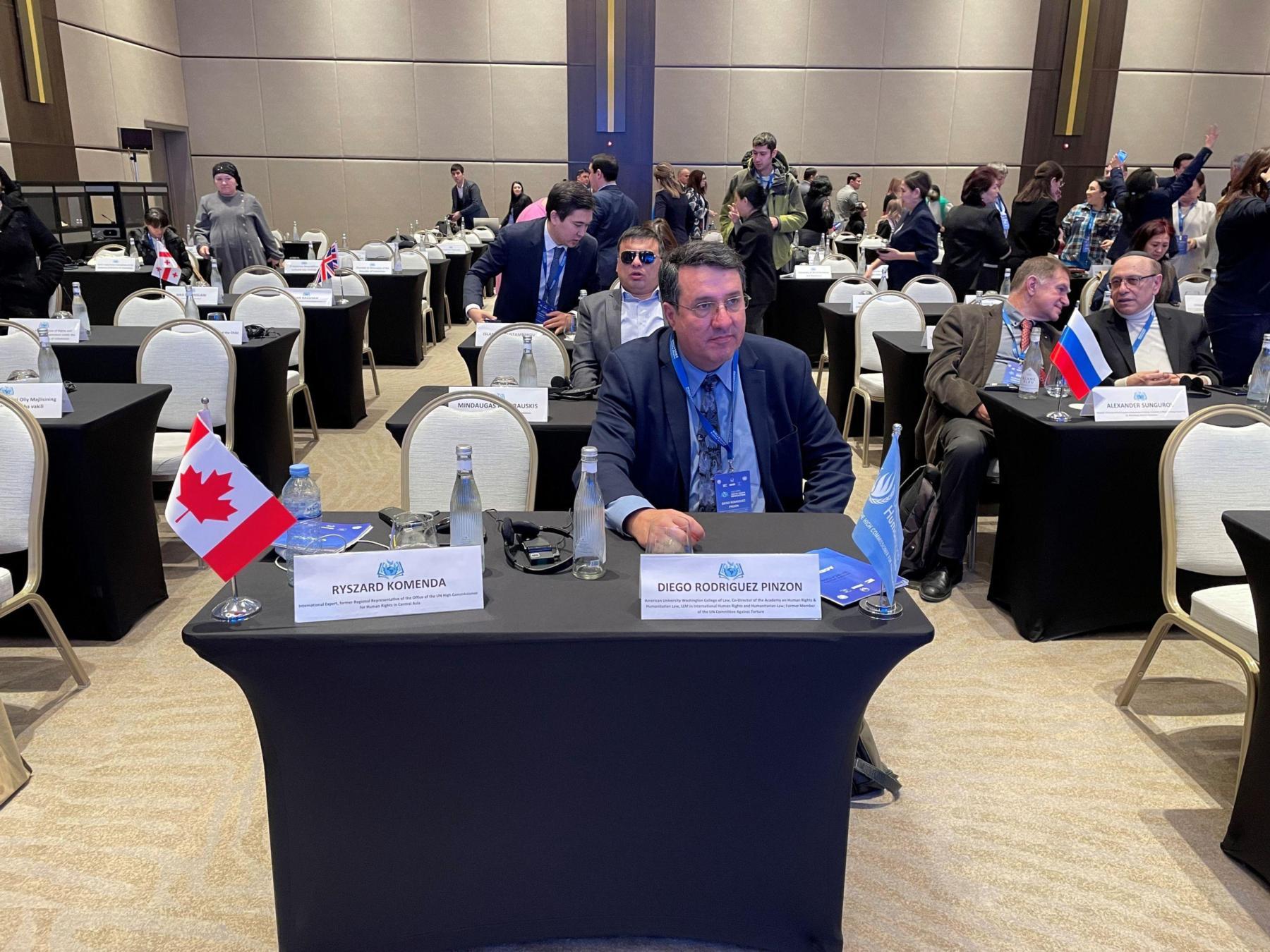
Professor Diego Rodríguez-Pinzón participates in Global Forum to Assess the UN Declaration on Education and Training in the Field of Human Rights
At a UN-sponsored forum in Uzbekistan on December 5-6, AUWCL Professor Diego Rodríguez-Pinzón discussed AUWCL’s contributions to the advancement of human rights education as an example of the implementation of the 2011 UN Declaration on Education and Training in the Field of Human Rights.
Professor Diego Rodriguez-Pinzon participated in the 2022 Global Forum on Human Rights Education on December 5 and 6, 2022, in Samarkand, Uzbekistan. This high-level event was hosted by the Office of the United Nations of the High Commissioner for Human Rights, the Council of Europe, the Organization for Security and Cooperation in Europe (OSCE), the Friederich Ebert Foundation (FES), and the National Center for Human Rights of the Republic of Uzbekistan, among other institutions. Prof. Rodriguez-Pinzon was invited to present “The Human Rights Education Ecosystem: the International Experience of a Law School in the Americas” as part of the panel “Human Rights Education in Higher Educational Institutions: Principles, Approaches and Contemporary Challenges.”
This panel offered insights into how AUWCL’s human rights programs have impacted the knowledge, awareness, and application of human rights in the Americas. Through an extensive alumni network built up through decades of postgraduate courses offered to students coming from all regions of the world, including North America, as well as Latin America and the Caribbean, AUWCL’s Academy of Human Rights and Humanitarian Law advanced the idea that human rights are part of all governmental action. The human rights dimension of public policies affecting prison systems, law enforcement, freedom of the press, housing, basic education, and the protection of the environment – to just mention a few examples – has been increasingly recognized thanks to the training of practitioners, human rights defenders, public officials and members of the judiciary, among others, at the LL.M. on human rights offered by AUWCL’s Academy. The Academy offers a dedicated LL.M. program on human rights in English and Spanish language, plus a high-profile Program of Advanced Studies during the months of May and June, and hosts the Inter-American Human Rights Moot Court competition.
Participants at this event included Volker Turk, UN High Commissioner for Human Rights; Federico Villegas, President of the UN Human Rights Council; Manfred Nowak, The Global Campus of Human Rights; Rein Mullerson, Professor Emeritus of Tallinn University; Akmal Saidov, Director of the National Center of the Republic of Uzbekistan for Human Rights; Devendra Kumar Singh, Secretary General of the National Human Rights Commission in India; Haci Ali Acikgul, Chairperson of the Independent Permanent Human Rights Commission of the Organization of Islamic Cooperation; Yazdursun Gurbannazarova, Commissioner for Human Rights in the Republic of Turkmenistan; Aslan Abashidze, Vice-chair of the UN Committee on Economic, Social and Cultural Rights; Jorge Jimenez Martin, Secretary General of the Ibero-American Network of Judicial Academies; Igor Rogov, Chairman of the Human Rights Commission under the President of the Republic of Kazakhstan; Stefania Giannini, UNESCO’s Assistant Director-General for Education, Muharrem Kilic, Chairman of the Human Rights and Equality Institution of Turkey; Elena Ippoliti, Coordinator of the Human Rights Education and Training Unit UN OHCHR; and Eva Pastrana, Head of Justice and Human Rights Training Division, Council of Europe.
More than 100 representatives of international, regional and foreign organizations participated in the global forum offline and online. Ten 10 international and six regional organizations, leading foreign human rights experts and professors from 30 countries were present in Uzbekistan. These made a total of more than 2,000 representatives of 150 national organizations participating in the forum. Furthermore, Prof. Rodriguez-Pinzon was also invited to deliver a model Masters class in the Samarkand State University, lecturing about the international protection of human rights with a focus on the Inter-American Human Rights system. The class was attended by 400 students in the ceremonial auditorium of the University and more than 2000 student joining the session virtually.
UN Declaration on Education and Training in the Field of Human Rights: Results and Contemporary Issues
In December 2011 the General Assembly of the United Nations adopted the Declaration on Human Rights Education and Training, which states that:
- every person and every organ of society should strive to promote respect for human rights and fundamental freedoms through education and training;
-every person has the right to education and that education should be directed to the full development of the human personality and a sense of dignity, to enable all persons to be useful participants in a free society and to promote mutual understanding, tolerance and friendship among all nations and all racial, ethnic or religious groups, and to contribute to the work of the United Nations in the maintenance of peace and security and the promotion of development and human rights.
By adopting the United Nations Declaration on Human Rights Education and Training, Member States deliver a clear message that human rights education and training is a priority for the international community. The Declaration re-affirms the responsibility of States to promote and ensure human rights education and training and to create a safe and enabling environment for the engagement of all relevant actors, including educational institutions, civil society organizations, national human rights institutions as well as the private sector.
A concrete outcome of the Forum is the adoption of the “Samarkand Action Plan to Promote Human Rights Education (2023-2024).” In such Action Plan the participants of the Global Forum on Human Rights Education, emphasize the important role of international and regional intergovernmental organizations, as well as the support of states, and submitted a set of recommendations of the Forum to the UN Secretary General and to other international organizations, as well as to the President of the Republic of Uzbekistan.

